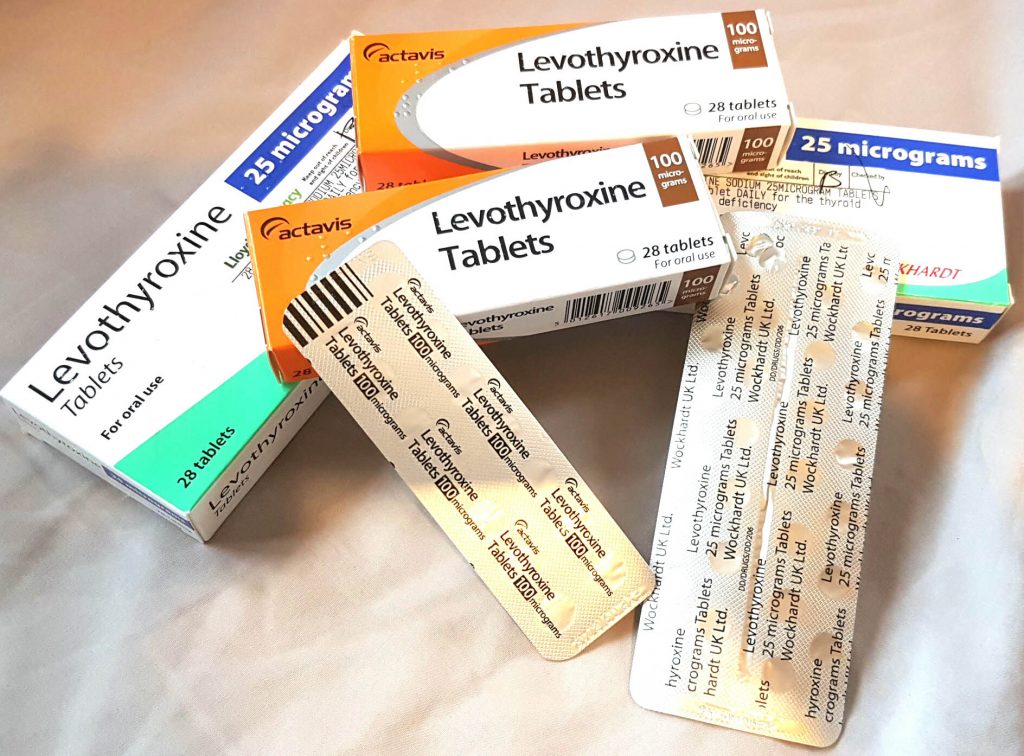Levothyroxine Sodium T4 Tablets Actavis Sale
What is Levothyroxine Sodium T4 Tablets?
Levothyroxine Sodium is a medicine used as treatment for low thyroid function. Symptoms of hypothyroidism include tiredness, depression, weight gain, cold sensitivity and slow movement or thoughts.
Levothyroxine is a prescription drug, and will be prescribed to you by a doctor after diagnosing you with hypothyroidism, or low hormone levels. You must not start taking Levothyroxine without a prescription. Levothyroxine is also known under the brand name Eltroxin.
If you are prescribed Levothyroxine, you will usually need to take it for a long time, or possibly the rest of your life. It will not make hypothyroidism go away. Do not stop taking Levothyroxine, or adjust your dose, without first speaking to your doctor or pharmacist. Levothyroxine tablets are available from your GP, or a registered UK online pharmacy.
Levothyroxine Sodium T4 Tablets How it works
Levothyroxine acts as a synthetic form of the hormone thyroxine, also known as T4. Hypothyroidism means that your thyroid hormone levels are low, and your body is not making enough thyroxine. Levothyroxine will act as hormone replacement for the hormones your thyroid gland is not making properly.
You will require regular blood tests (usually annually) for as long as you are taking levothyroxine to monitor it, to ensure the medication is working properly, and to determine you are taking the right dose.
You will usually start on a low dose of Levothyroxine, which will increase or decrease based on your body’s response to it.
Levothyroxine Sodium T4 Tablets Before you take it
There aren’t any significant risks associated with taking Levothyroxine. It can be taken by most adults and children.
It is very important you talk to your doctor if you are pregnant or planning to become pregnant if you have been prescribed Levothyroxine. For women who are pregnant, it’s possible their dosage may need to be increased, because low thyroid hormones can cause harm to an unborn baby.
There is research to suggest that Levothyroxine may be ineffective in treating hypothyroidism in the elderly. If you are in any doubt, seek medical advice.
Levothyroxine tablets can contain lactose. If you are lactose intolerant, you should consult your doctor before taking this medication.
Levothyroxine should not be used to treat any other symptoms. If you are experiencing other symptoms or have another condition, please contact your doctor.
Levothyroxine should not be taken by those with hyperthyroidism (overactive thyroid.) It also must not be taken by anybody who has had an allergic reaction to Levothyroxine (or any of the ingredients in the tablets) in the past, nor should it be taken by anyone who experiences problems with their adrenal glands.
You should check with your doctor before taking levothyroxine if you have experienced any of the following:
Heart problems, such as heart disease, heart failure or a heart attack
High blood pressure
Diabetes
Angina
Levothyroxine can interact with other prescription drugs or medications you may be taking. It may interact with the antidepressants amitriptyline, maprotiline, and sertraline, potentially causing heart problems.
It can also interact with blood thinners, such as warfarin, making you more susceptible to bleeding.
It may also interact with ketamine, causing rapid heart rate and high blood pressure.
Levothyroxine Sodium T4 Tablets Dosage Instructions
You should always refer to the patient information leaflet, as well as your prescription, when deciding how much levothyroxine to take.
It is advisable to take Levothyroxine in the morning, before your first meal of the day. Take the tablets with plenty of water.
For adults 18-49, the typical dose is 50-100 micrograms every day. This should be adjusted by 25-50 micrograms every 3-4 weeks, depending on your body’s response and blood test results.
For adults 50 and over, the typical dose is 25 micrograms every day. This should be adjusted by 25 micrograms every 3-4 weeks, depending on your body’s response.
It is very important that you take Levothyroxine tablets daily at least 30 minutes before eating or before drinking caffeinated drinks such as coffee or tea. This is because food and caffeine can impact the absorption of Levothyroxine into the intestines and lining of the stomach.
It is also important that you do not take Levothyroxine (at the same time as) if you are taking other potentially interfering medicines, such as ferrous sulphate or calcium carbonate. Please refer to the patient information leaflet for a full list of medications with which Levothyroxine may interfere, and see your doctor if you are in any doubt.
Common Side Effects of Levothyroxine Sodium T4 Tablets
When taking Levothyroxine, there is a risk of experiencing side effects. However, it is very important that you do not stop taking the medication or change the dose before you tell your doctor. When taking Levothyroxine, you may find that you experience the following possible side effects:
Headaches
High temperature, including sweating or flushing
Delayed or irregular menstrual periods
Fast heart rate
Pounding irregular heart rate
Muscle weakness or cramps
Diarrhoea
Vomiting
Temporary hair loss in children
Tremors, restlessness and excitability
Difficulty sleeping
Weight Loss
Please be aware that it may take up to 5 days for you to experience some of these symptoms. They will usually disappear after lowering the dose or stopping the tablets, but you must not do this unless your doctor or healthcare professional tells you to.
It’s also possible for some people to experience serious allergic reactions to Levothyroxine. In this rare case, you must stop taking the tablets. You must call your doctor straight away if you experience any of the following serious side effects:
Swelling of the face
Swelling of the tongue, lips and throat
Trouble breathing
Severe itching of the skin
Sensitivity to the sun
A general feeling of being unwell





